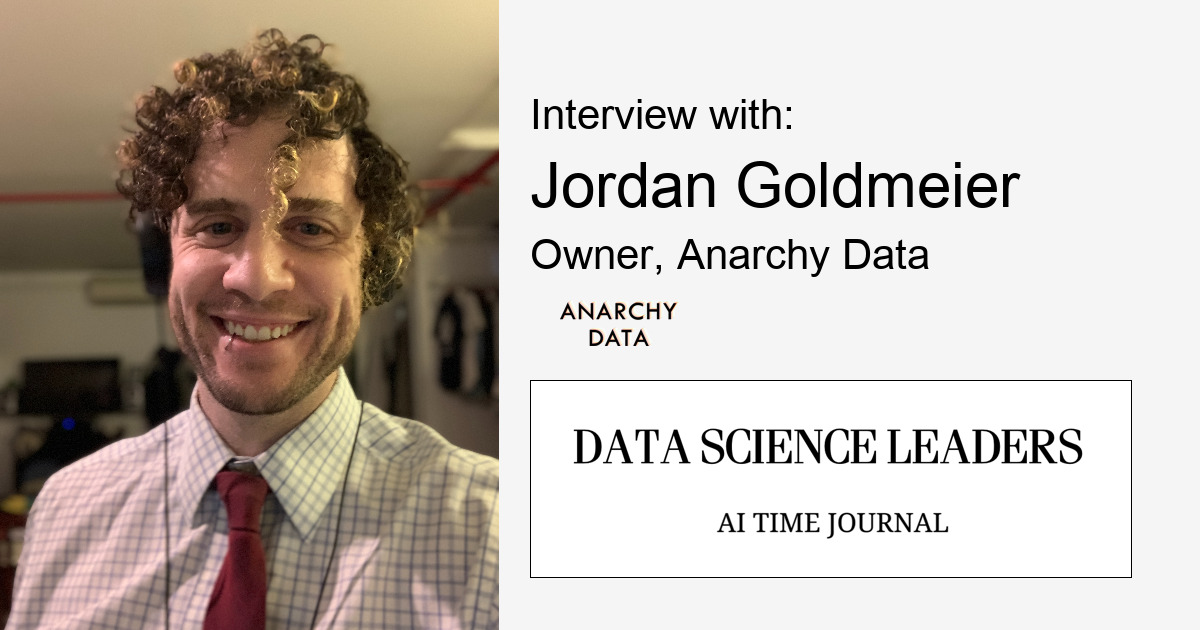
We thank Jordan Goldmeier from Anarchy Data for taking part in this interview and sharing several insights, including:
- His journey into Data Science and advice to business leaders
- Exciting breakthroughs in Data Science
- Valuable resources and skills to be the next Data Scientist!
Have realistic expectations. We live in a world where we can see firsthand what data can do.
– Jordan Goldmeier
Getting into Data Science
At what point did you realise that you wanted to pursue a career in data science (data & AI), and how did you get into it?
I’ve always loved data. In truth, I did not realize there were data science jobs when I was younger. I went to school for accounting and finance (and minored in computer science). Though, in my free time, I would read books on programming and modeling. It always fascinated me.
After college, I landed my first job as an auditor for the United States Air Force. I quickly realized I wasn’t a great auditor. I was more sympathetic to the client than I was to the rules I was trying to enforce. I realized I needed a new role.
I landed a job as what was described then as a operations research analyst. Though I do think operations research is its own field, at the time, the work we were doing would later become data science. This work made a lot of sense to me. It combined my experience of business and programming.
What advice would you give to other business leaders who would like to step into realising data science use cases?
As many of my followers know, I have just wrapped up my book Becoming a Data Head, co-authored with Alex Gutman (he is a data scientist at 84.51). In the book we talk about a lot of the pitfalls when working in data science. I can’t repeat it all here, but some of the main themes are:
- Correlation doesn’t imply causation. This one seems obvious, but the real trick isn’t to continually remind yourself of this point. Rather, it’s just that most data you collect is observational, and you must always assume bias is baked into observational data. To assign causality, you must run an experiment. If you didn’t run an experiment, don’t assign causality. I see far too many companies focus on avoiding the logical fallacy of correlation/causation, when more time ought to be spent on creating experiments.
- Have realistic expectations. We live in a world where we can see firsthand what data can do—from digital personal assistants to image recognition. But your ease of access to these technologies (they’re on your phone, in your car, etc…) does not mean that you will have an easy time recreating them in your business. For deep learning in particular, you need a lot of high-quality labeled data.
- Let your employees break stuff. I’ve been to multiple corporate offices where IT was afraid to let non tech teams (like accounting) use Power BI. “It would overwhelm them” I heard one say. My response, “so what?” Some might be overwhelmed—but you’ll figure out what they need to learn. It’s just not a good reason to delay having your staff use the technologies.
Exciting breakthroughs and the way forward
In your opinion, what have been the most relevant breakthroughs in data science impacting our world in the last 1-2 years, and what trends do you see emerging going forward?
Overall, access to labeled data, faster GPUs, and cloud computing have all allowed for great advancements in deep learning over the last few years.
I think the biggest breakthrough that hasn’t fully crossed into data science (at least, at the academic level) is blockain and distributed ledger. These technologies can actually create an authentic and verifiable “ground truth” around your data.
What are some of the exciting features that you have used in Microsoft Excel 365 which are beneficial for data analysis?
I would say the entire Excel 365 product is fantastic for data analysis. The features I use most are Power Query, formulas, and Pivot Tables. I probably use Pivot Tables the least (but end up teaching them the most!), because I like the precision that formulas provide me. But, Excel 365 also includes some interesting new technologies like the Forecast sheet.
Do you think going forward, working with data will become completely no code?
A significant portion of analyst’s work will become no code. And there may be data scientists that are really good at low and no-code methods. But there will always be a need for coders.
Finally, don’t expect to win every fight. Instead, focus on where data can make predictions about the business and compare those to the gut-heavy decision maker’s.
– Jordan Goldmeier
What lessons have you learned on getting the company’s bought in to leading through data versus gut?
If you’re dealing with someone very resistant to data, you need to meet them where they were first before leading them to the data. Most people will tell you why they don’t like trusting the data: they were burned in the past, they don’t like math, etc. Tailor your delivery to match their style and make sure your work addresses why this won’t be like the failures of the past.
Finally, don’t expect to win every fight. Instead, focus on where data can make predictions about the business and compare those to the gut-heavy decision maker’s. Once the decision maker sees the predictions do better than them – or, at the very least, confirm what they were suggesting – they are likely to be more trusting. However, if your model does worse, then you haven’t beat the naive case, and they’re right: their gut is better than the model.
So before you challenge someone who is gut-heavy, make sure your model actually works!
Final Thoughts
What is one book that has given you the best practices of growing a business?
Profit First – by far the most important book on how to actually make money in your business.
What skills and attitudes do you look for when hiring data scientists?
Data science projects are very team based, so I’m looking for someone who I can work well with.
Can you talk about one or two data science leaders that have inspired you?
Kirk Borne – Kirk was at my first conference talk in 2014. That talk, called Becoming a Data Head, became the book that will be released in May, 2021.
Alex Gutman – Alex is the book’s co author, but also an incredible friend. Alex and I have spent the last decade on late night phone calls comparing the best ways to explain tough data science and statistical concepts to less technical audiences.
